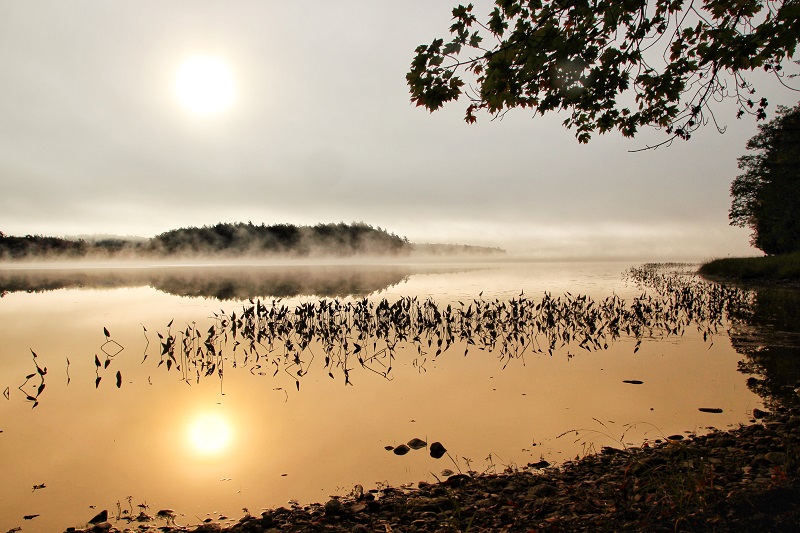I ask my adult daughter Isabella several times to join me on a wilderness canoe trip to Kejimkujik National Park in Nova Scotia before she finally agrees. I’m sure her hesitation and lukewarm enthusiasm are signs that I’ve badgered her into it.
When we arrive in the park at Jake’s Landing to load and launch our canoe, we find others doing the same. Moms and dads fit little lifejackets onto their toddlers and their dogs. Parents carry rental canoes and kayaks, paddles and PFDs to the water from Whynot Adventure, the outfitter here at Keji. I’m transported back fifteen years to when our family did the same. I would plunk Isabella’s little brother in the bow of a tandem kayak and paddle out to see the loons. As he grew older, he and I went on wilderness canoe trips to increasingly rugged and remote areas of Nova Scotia.
In contrast, Isabella is not an outdoorsy person. Neither is she entirely comfortable among people. Like many young women, she has always been self-conscious about her looks. As we prepare to cast off from among the other boats, I notice she’s carrying herself differently and using her public voice.
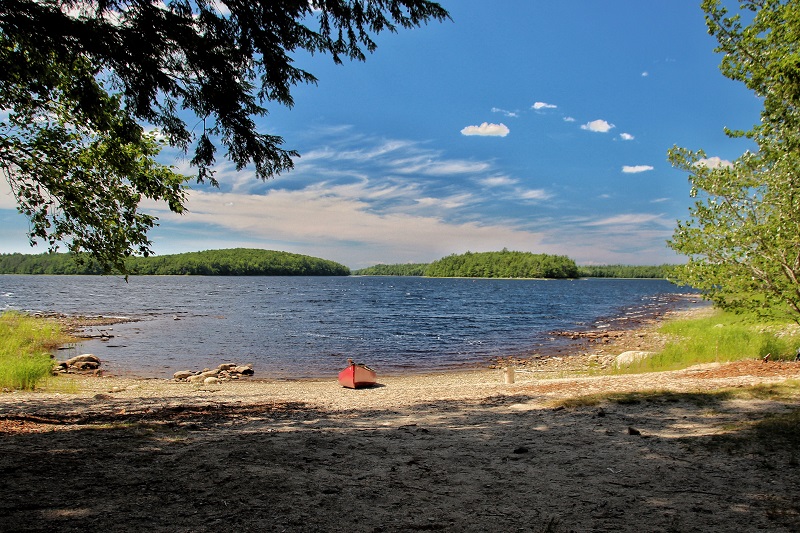
Campsite on Ritchie Island, Kejimkujik NP Photo Darcy Rhyno
Out on the lake paddling to our backcountry campsite on Ritchie Island, she seems to relax, even as the wind and waves pick up. I think the conditions must be scaring her. When we reach our campsite and pitch our small tent beneath the canopy of tall hemlock, pine, and maple, I worry she’ll find it awkward to sleep next to “the old man.” When we locate the outhouse, I worry she’ll find it less than discreet and more than disgusting. Add insects, a bear hang for our food pack, the absence of electricity or running water, and I worry it’ll all be too much for my sensitive, fragile girl.
I couldn’t have been more mistaken. Our short wilderness trip reveals much that surprises me about her private motivations, her surprising responses to nature, her emotional life, and her thought processes.
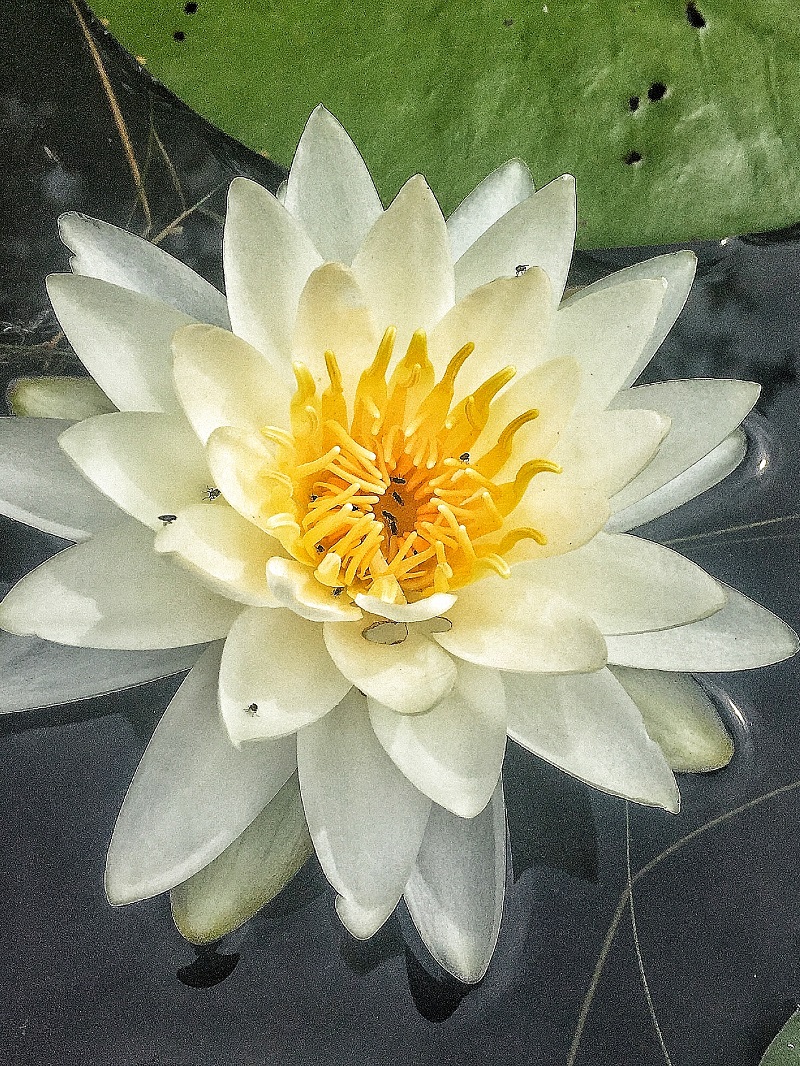
Water lily, Kejimkujik Lake Photo Darcy Rhyno
Nature is Magic
Isabella is home for the summer from university in Ottawa where she’s working on a graduate degree and lives with her boyfriend. It was his idea that she escape to the Atlantic bubble away from Ontario’s summer heat and out of the apartment where the COVID-19 lockdown had confined them for months. She’s spending the summer working remotely, looking up high school friends, and enjoying her favourite hobby, sewing.
Sure, a sweltering city apartment in a lockdown is claustrophobic, but what about a tiny tent with zero personal space, I want to know. To my surprise, her biggest concern is losing sleep. “If you snore, I’m gonna kill you,” is how she puts it. “I’m around you all the time. I’ve seen the worst and the grossest. I can enjoy the time rather than constantly trying to come off as happy and excited. It’s exhausting. But with you, I don’t have to do that.”
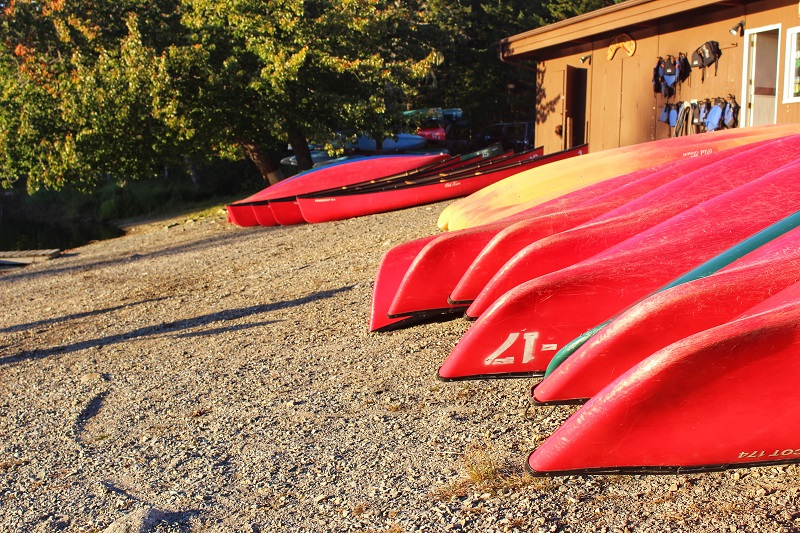
Rentals at Whynot Adventure, the outfitters at Keji Photo Darcy Rhyno
After we set up camp, we go for a sunset paddle. We slip into the lee behind neighbouring Little Muise Island where the wind won’t tire us and let the canoe drift over the mirror-smooth surface. The island ends in an ellipsis of boulders where a pair of loons is fishing. Rather than disturb them, we turn east toward Ell Island. As we approach, we see three canoes pulled up on a pebble beach and hear voices. Male voices. Young men are yelling, laughing, and playing a game like horseshoes or washers. Undoubtedly, drinking is involved. Jokingly, I suggested we stop in, have a beer with the boys.
“Hard no!” is Isabella’s response as she picks up her paddling pace. Her reasons for avoiding them are not what I expect. “I’m sure they’re nice guys, but young men are usually rowdy, and I just don’t have the social energy for whippersnappers like that.” She’s 25 going on 40. “You have to give yourself a few slaps, put on a smile, and pretend you want to have a good time. But I’m really just thinking about the sewing I’m missing or the chapter I could have read.”
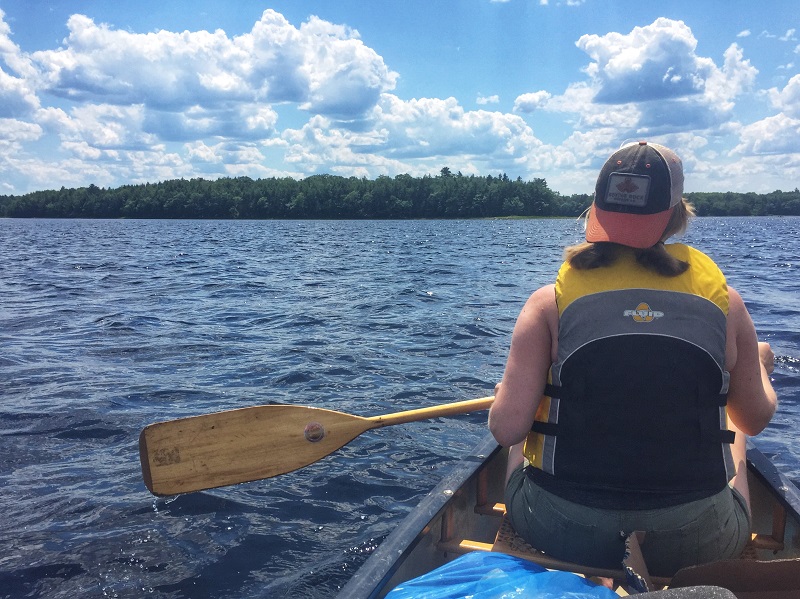
Isabella paddling on Kejimkujik Lake Photo Darcy Rhyno
I’m reminded of how social anxieties haunt her, but then I recall that she sometimes seeks encounters with the natural world to quell those anxieties. And nature is never more significant than in a national park.
“At first, quiet wilderness stresses me out because there’s not enough going on,” she explains. “I’m used to watching YouTube or Netflix or having the radio on while I do something else.” We get so caught up in the minutia of everyday life and our issues, we lose perspective, she says. It seems counterintuitive, but her anxiety fades because she feels small. “When I’m in the wilderness for a while, I realize I’m not that important. You could be out here for a whole weekend, and the trees are still going to keep doing what they’re doing. Nature doesn’t care.”
Campfire Tales
Back at the campsite, we prepare dinner – beef tacos from scratch, including the tortillas. She doesn’t usually like cooking, but we enjoy each other’s company as we work together. She had yet another surprise for me when I asked her why she finally decided to accompany me on this trip.
“I usually spend a ton of time with Mom because we like all the same things – sewing, shopping, picking out each other’s outfits, gossiping.” She adds that her motivations were mixed with those that brought her back to Nova Scotia in the first place. “I’m home because of the pandemic, but also because now it feels like I’m an only child.”
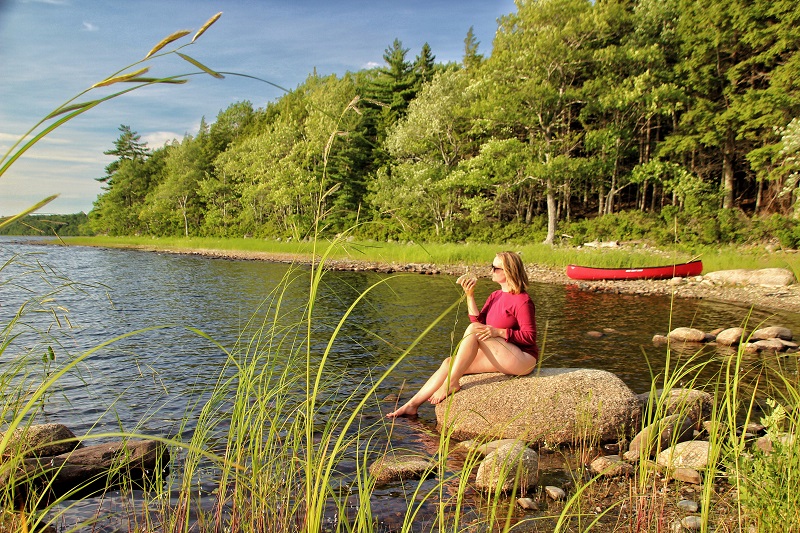
Isabella enjoying her taco at Keji Photo Darcy Rhyno
Her words floor me. For some time, her brother and his girlfriend have forbidden Isabella any contact with them. One day the three were best friends. The next, her name was not to be spoken. Later, they placed his mother and I behind the same wall. Christmas, birthdays, Mother’s Day, and Father’s Day have come and gone. If it doesn’t concern death or documents, it’s not permitted. We’re not sure why.
“I know how hard it’s been on you guys,” she continues. “It’s not the time to leave you alone. When one child is voluntarily absent, you have to be two children. I thought about this when you invited me canoeing. Normally, you’d have called him, and he would have gone on this trip.”
I want to hug her. She remembered that her brother and I once went on canoe trips deep into the wilderness, finding our route along isolated waterways, camping at sunset. Sharing a tiny tent as she and I are doing. She knew I’d be feeling the loss.
My daughter is now a woman who empathizes deeply with others. She knows her emotional landscape and is therefore acutely aware of ours. She understands what she needs to keep an even keel and can gauge our needs in the same way. Being in nature with all these trees, rocks, and water on our wild Kejimkujik island is putting her troubles in perspective. She wanted the same for me.
At dusk, there is no sound but the loons’ lonely calls and the crackling of the campfire. I ask if she’d like to talk about any serious matters because I know that when she voices her troubles, they tend to drift away.
After a pause, she says, “I can’t think of anything. It’s that nature magic.” She also doesn’t want to go over old ground yet again about her brother, so she asks if I have anything I want to talk about. “The stuff I’ve dealt with makes it easier for me to hear you out,” she says. So, I talk. As I do, my troubles drift away with the breeze off the lake that’s dissipating among all those trees.
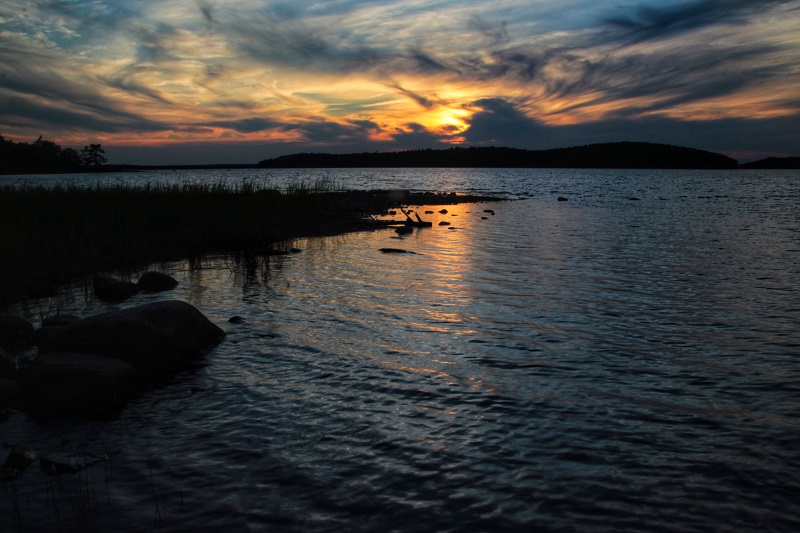
Sunset from the campsite, Keji Photo Darcy Rhyno
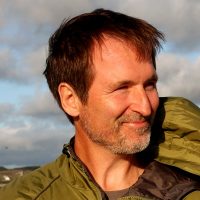 By Darcy Rhyno
By Darcy Rhyno
Darcy Rhyno is an award-winning travel writer/photographer who hides out between trips in a tiny fishing village on Nova Scotia’s South Shore. Check out his two short story collections, two novels, plays, photos and awards at darcyrhyno.com.

